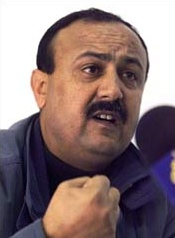| Powell: Arafat
not needed at Mideast conference
Israel arrests Arafat aide April 15, 2002 Posted: 12:24 PM EDT (1624 GMT)
A Palestinian Cabinet member accused Sharon of co-opting a proposal by Saudi Crown Prince Abdullah. "It's not a Sharon idea; it's not an Israeli idea. Sharon is trying to change the idea and make it his own," said Ziyd abu Zayad. "Now there is no logic which would accept a conference dealing with the Palestinian cause without the presence of the Palestinian leadership. ... Arafat should be the first to attend that conference." At the Arab League summit last month in Beirut, Lebanon, the Saudi crown prince presented a plan that would guarantee Israel normal relations with the Arab world in exchange for Israel's withdrawal to its borders before the 1967 Six Day War. Sharon said he wanted to attend the summit to discuss the proposal but was not invited. Fear over Lebanon
border attacks
Israel has responded with heavy air attacks against suspected Iran- and Syria-backed Hezbollah hideouts in southern Lebanon. "It is critical for those who support peace to act immediately to stop attacks across the border," Powell said after meeting with Lebanese Foreign Minister Mahmoud Hammoud. "We confirm that Israel is responsible for the current escalation because it blocked all former efforts seeking peace and rejected international resolutions that demand its withdrawal from all occupied Arab territories," Hammoud said. "Consequently, the resistance and the Intifada became the only way to force Israel into implementing these resolutions." Powell also met with Lebanese Prime Minister Rafiq Hariri, who called for a "peaceful comprehensive political solution." Powell then traveled to Damascus, where he met with Syrian President Bashar Assad. They were expected to discuss violations of the so-called "Blue Line." Drawn by the United Nations two years ago, it marks the border between Lebanon and Israel after the Jewish state withdrew its troops from southern Lebanon following a two-decade occupation. Of his overall Mideast mission, Powell said, "What I am interested in doing right now ... is bringing an end to the violence, bringing an end to this conflict, because what we need to do is get violence down so we can go forward as quickly as possible to find a political solution." Violence reported
in West Bank
Fighting and casualties also were reported Monday in and around the city. The standoff continued at the Church of the Nativity, where an estimated 200 armed Palestinians, along with some 40 church workers, have been holed up inside since taking shelter during an Israeli military incursion that began April 2. (Full story) In Jenin, Palestinian teams Monday went into the refugee camp and located 14 bodies, Israel Radio reported. The teams removed seven bodies, but seven others were not moved because of the fear buildings would collapse, according to reports. Palestinians have accused the Israelis of carrying out a massacre at the camp, killing as many as 500 people. Israeli Defense Minister Binyamin Ben-Eliezer dismissed the allegations Sunday, saying "dozens, not hundreds," were killed. Allowed to go into the camp, Israeli reporters said they saw widespread destruction but no signs of a massacre. In Jersusalem, the Israeli Cabinet approved a plan that would set up security "belts" along the border between Israel and the West Bank, sources said Monday. The belts would be five kilometers wide, with fences and electronic surveillance intended to prevent Palestinians from passing into Israel and to limit crossings to specific sites, the sources said. In their meeting Sunday, Arafat demanded that Powell get a firm timetable from the Israelis on their withdrawal from Palestinian territories before any talks on a cease-fire go forward. But after talking Sunday night with Sharon, Powell made no announcement about a schedule for the Israeli pullout. Sharon has said Israeli troops will withdraw after Operation Defensive Shield, which began March 29, roots out what he called the "terrorist infrastructure." The Palestinians have called the campaign an Israeli reoccupation of the West Bank.
|
